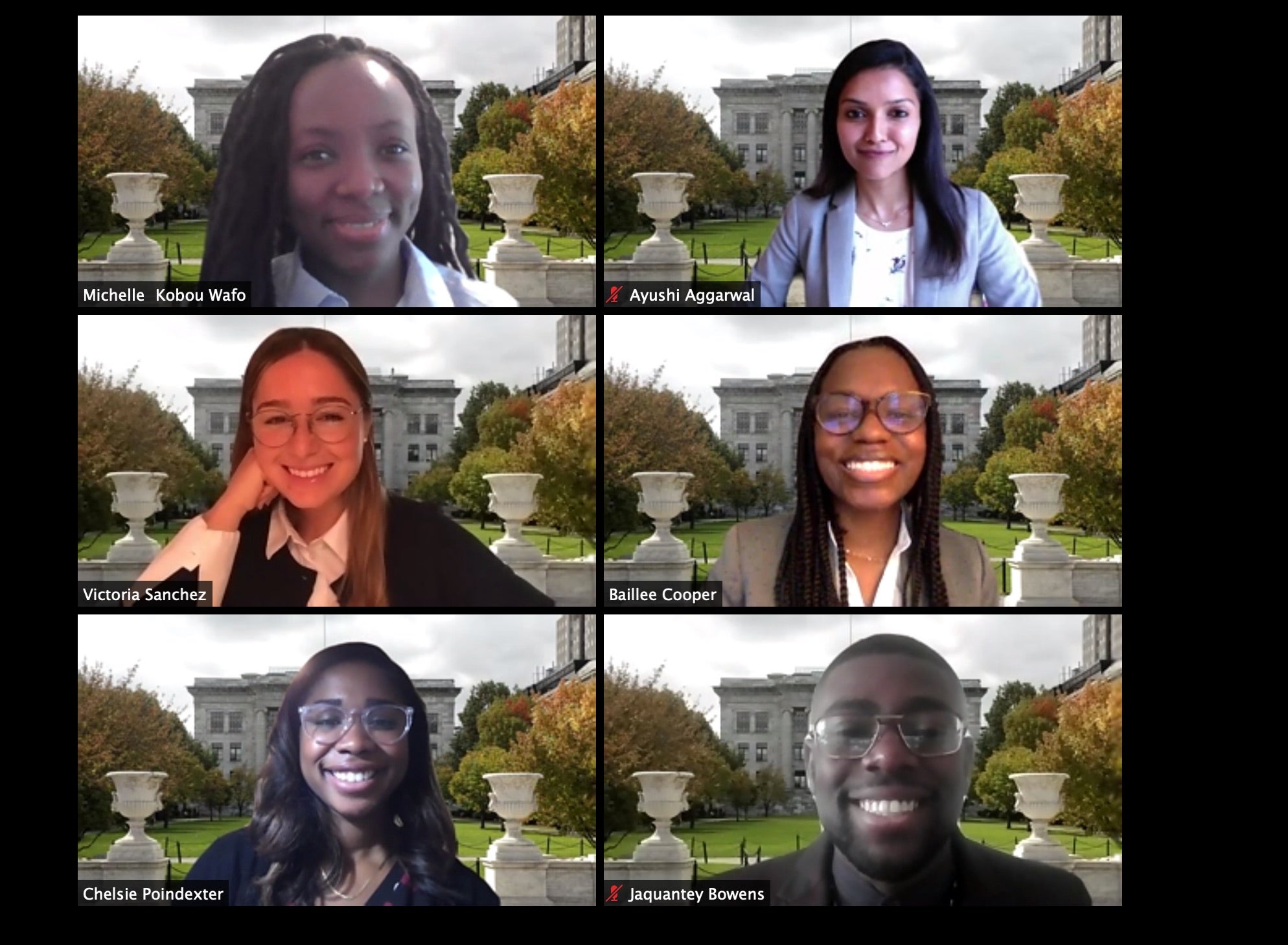News & Highlights
Topics: Clinical & Translational Research, Diversity & Inclusion, Education & Training, Mentoring
Diversifying the Future of Medicine
Visiting interns from medical schools across the country showcase their research projects at virtual closing ceremony.

Each July, Gordon Hall’s Waterhouse Room at Harvard Medical School (HMS) is the setting for student presentations of their mentored research project they participated in over the summer. This year, the room wasn’t filled with proud mentors and family applauding in the audience; the students were in their homes, presenting via Zoom.
“Since 2009, the Visiting Research Internship Program (VRIP) has supported 71 students in medical clinical and translational research. Most students are from groups underrepresented in medicine or from disadvantaged backgrounds,” said Joan Reede, dean for diversity and community partnership at HMS, as she welcomed attendees to the recent VRIP closing ceremony held on July 23.
“Since 2009, the Visiting Research Internship Program (VRIP) has supported 71 students in medical clinical and translational research.”
Every year, medical students from across the U.S. come to Boston to participate in VRIP, offered by the Harvard Catalyst Diversity Inclusion program, which Reede described as “a mentored summer research program designed to enrich medical students’ interest in research in health-related careers, particularly in the areas of clinical and translational (c/t) research.” VRIP gives first- and second-year medical students the opportunity to conduct innovative research projects with mentors from HMS and its affiliated hospitals and partner institutions.
Students kept an open mind in participating in this new format. “Our students have had a fantastic experience working virtually with their mentors, completing Harvard Catalyst research courses, and attending lab meetings, virtual seminars, and networking receptions from their homes,” continued Reede.
Introducing the student presentations, Mary Frances Lopez, faculty assistant director at HMS’s Office for Diversity Inclusion and Community Partnership, told attendees, “This is a very special day for the VRIP students, because they will be presenting the work they have completed for the past five weeks.” Research projects that could be done outside the lab, including data analysis, manuscript writing, and survey studies were conducted by the six students.
Three of this year’s interns had the opportunity to conduct COVID-related research. Ayushi Aggarwal, University of Maryland School of Medicine, examined personal protective equipment (PPE) use during the COVID-19 pandemic under her mentor Adriana Panayi, MB, ChB, Brigham and Women’s Hospital. Specifically, Aggarwal looked at how adherence to Center for Disease Control guidelines on PPE-use compared among different states and health professional in the United States.
Investigating the impact of COVID-19 on the cardiovascular system with a focus on the pulmonary vasculature and human heart, Jaquantey Bowens, Indiana University School of Medicine, conducted a literature review of existing and recently published coronavirus scientific journals. Bowens was mentored by Guillermo Garcia-Cardena, PhD, Brigham and Women’s Hospital.
Michelle Wafo, Albany Medical College, along with her mentor Sylvia Rosas, MD, Joslin Diabetes Center, conducted research on the impact and outcomes of COVID-19 in patients with a history of diabetes in chronic kidney disease.
Students projects examined other innovative areas of clinical and translational research as well. Baillee Cooper, Tufts University School of Medicine, used statistical analysis to validate a new outcome measurement assessment for pediatric myasthenia gravis with her mentor Bo Zhang, PhD, of Boston Children’s Hospital.
Victoria Sanchez, Indiana University School of Medicine, focused on using magnetic resonance spectroscopy to identify non-invasive biomarkers in IDH-Mutant Gliomas. Her mentor was Alexander Lin, PhD, Center for Clinical Spectroscopy at Brigham and Women’s Hospital.
Recognizing the potential impact of her work, Lin told attendees, “The results of Sanchez’s study not only provide great insight into the prognosis of using magnetic spectroscopy, but also provides us with practical information for the use of this technology in clinical practice.”
An investigation into distinguishing stroke from stroke mimics in emergency care was presented by Chelsie Poindexter of Meharry Medical College. Under the guidance of mentor Joshua Joseph, MD, Beth Israel Deaconess Medical Center, Poindexter’s research focused on improving the overall diagnostic protocol for stroke in acute emergency settings.
As with many summer internships, VRIP lasts only five weeks, which is not a typical time frame to perform a research project, emphasized Lopez. “Students will continue to work for the next few months with their mentors to complete their projects and hopefully publish or write an abstract for a national meeting,” she said.
Videos and written messages from student’s mentors acknowledging their achievements concluded the ceremony.
“She’s learned to code in Python, she’s learned to use a number of data analysis toolkits, but she’s also written her own statistical analysis using her own code. For a few weeks’ worth, this is incredible progress,” said Joseph, discussing Poindexter’s work.
“It is imperative to expand opportunities and mentorship to medical students, especially underrepresented minorities so we can enrich the pipeline of physicians entering research fields.”
“I was really happy how quickly she learned. She learned about regulatory issues, how to create a survey, do a literature search, and work with REDCap, said Rosas, commenting on her collaboration with Wafo.
Programs like VRIP impact not only medical students’ careers, but also the future of c/t research. “It is imperative to expand opportunities and mentorship to medical students, especially underrepresented minorities so we can enrich the pipeline of physicians entering research fields,” said Jessica St. Louis, program manager for faculty development and diversity inclusion.
As they celebrate their successes, the students will continue to advance the work they began this summer by submitting abstracts for the 2021 New England Science Symposium, which will allow them to reconnect with one another. “I’m really excited to meet everyone in person,” said Sanchez. “I’m really grateful that Harvard Catalyst believed in us enough to create and embrace this very unconventional program style.”

